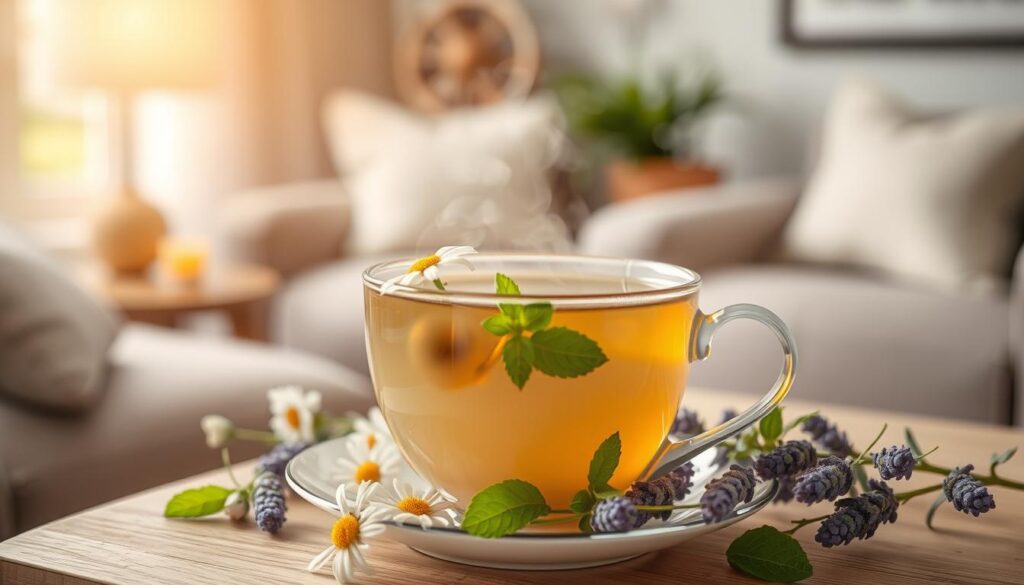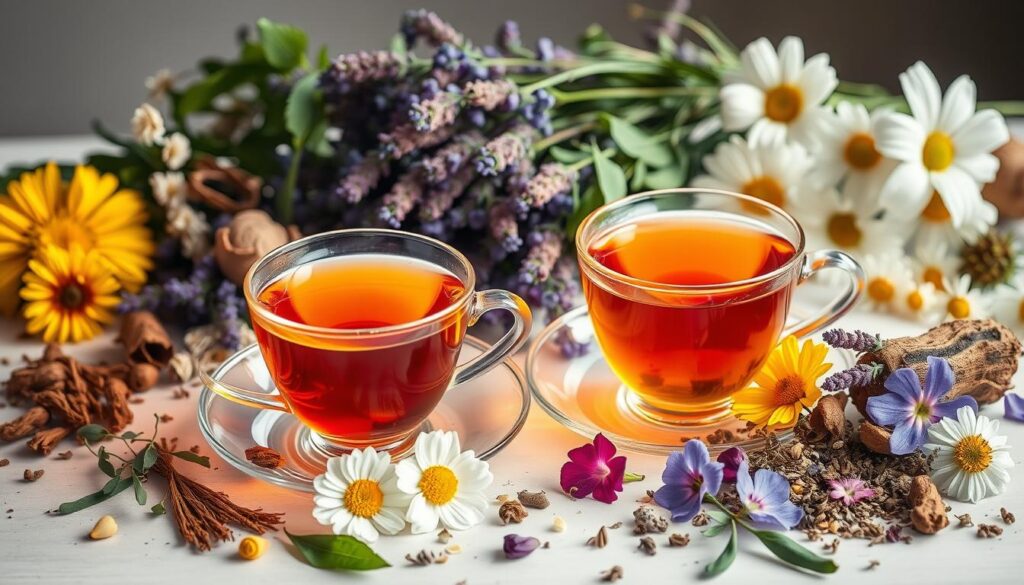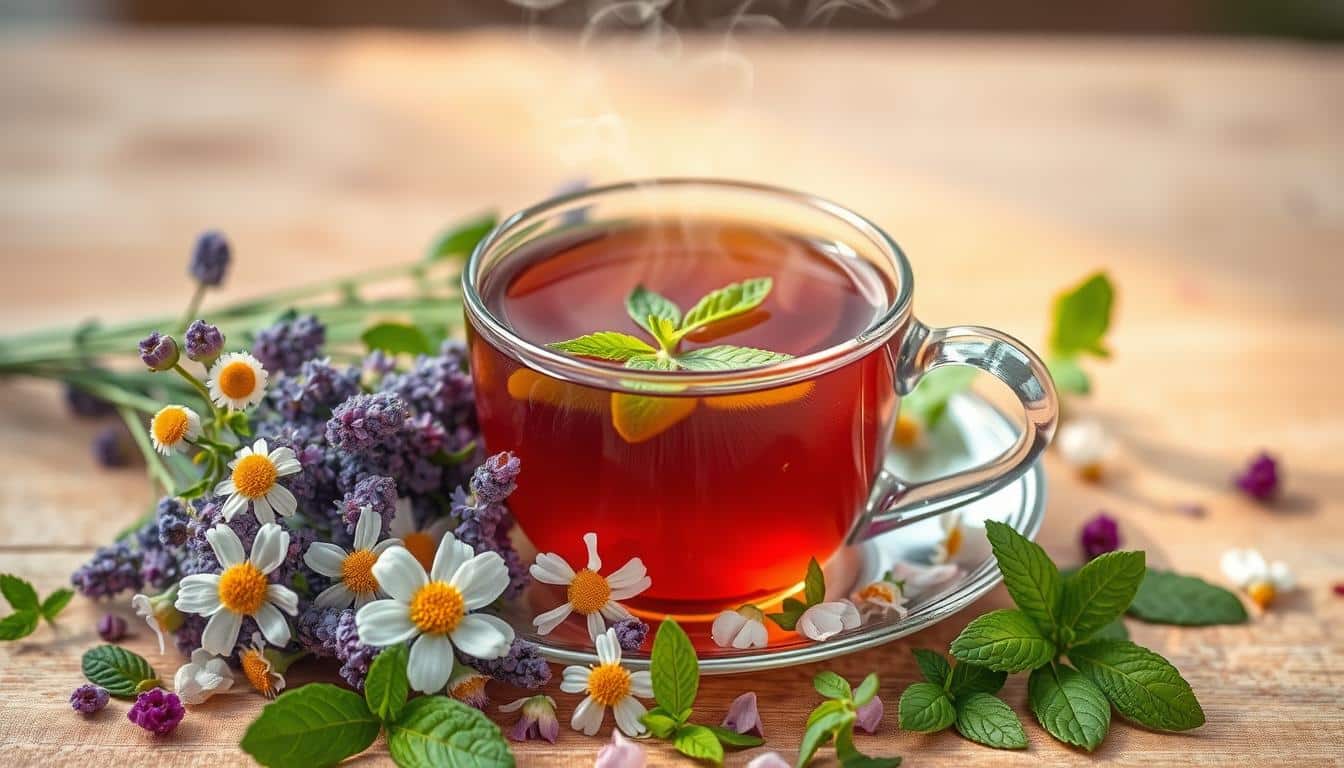As you settle into your evening routine, the gentle aroma of a soothing cup of herbal tea fills the air. It beckons you to unwind and find solace. Herbal teas have long been revered for their ability to promote relaxation, alleviate anxiety, and improve sleep quality.
Whether you’re struggling with restlessness, stress, or the occasional bout of insomnia, these natural remedies offer a comforting solution. They help you find the peace and rejuvenation you deserve.
Key Takeaways
- Herbal teas are natural sleep aids that can help you relax and drift off to sleep more easily.
- Certain herbs like chamomile, valerian root, and lavender have been shown to have sedative effects. They can improve sleep quality.
- Herbal teas are a healthier alternative to caffeinated beverages. They are especially good for those dealing with stress or sleep problems.
- Incorporating a bedtime tea ritual can create a sense of calmness. It prepares your body for restful sleep.
- Exploring various herbal tea blends can help you find the perfect sleep-promoting combination for your needs.
Understanding the Benefits of Herbal Teas for Sleep and Anxiety
Looking for a natural way to sleep better and feel less anxious? Herbal teas might be what you need. These teas are made from plants and can help you relax. They support your health and well-being.
Learn about the science behind herbal tea benefits. Find out how these teas can become your go-to relaxation tea.
The Science Behind Herbal Tea Benefits
Herbal teas have plant-based compounds that can help with sleep and anxiety. Research shows that chamomile, lavender, and valerian root can calm you down. They work by affecting brain receptors, leading to better sleep and less anxiety.
How Herbal Teas Promote Relaxation
Herbal teas are a natural sleep aids option. They don’t have the harsh effects of synthetic sleep aids. The compounds in these teas interact with brain chemicals, helping you relax. This method is safe and doesn’t lead to addiction.
Natural vs. Synthetic Sleep Aids
Pharmaceutical sleep aids might work fast, but they can have side effects and lead to dependence. Herbal teas offer a safer, natural sleep aids way to improve sleep and reduce anxiety. They are gentler and have fewer risks, making them a better choice for many.
“Drinking a warm cup of herbal tea before bed can be a soothing ritual that helps you unwind and prepare for a restful night’s sleep.”
What is the best tea for sleep and anxiety?
Getting a good night’s sleep and handling anxiety can be tough. But, herbal teas offer a natural way to help. Several teas are known to be great for sleep and anxiety:
- Chamomile tea is famous for its calming effects. It has a compound called apigenin that may help you relax and sleep better.
- Valerian root tea is known for its muscle-relaxing properties. Studies show it can improve sleep quality.
- Lavender tea can help with insomnia, anxiety, and even depression. It’s effective when inhaled or drunk.
- Passionflower tea boosts mood and helps with anxiety, insomnia, and pain. It also helps with stomach issues.
These teas are a gentle way to tackle sleep and anxiety issues. They don’t have the side effects of synthetic sleep aids. Adding them to your daily routine can help you sleep better and manage stress.
| Herbal Tea | Key Benefits | Supporting Research |
|---|---|---|
| Chamomile | Relaxation, Sleep Promotion | A 2024 review found chamomile tea improved sleep quality by reducing the number of awakenings after sleep or staying asleep. |
| Valerian Root | Muscle Relaxation, Sleep Improvement | A 2020 review of 60 studies concluded that valerian root could be a safe and effective treatment for promoting sleep and preventing associated disorders. |
| Lavender | Anxiety Reduction, Insomnia Relief | Studies have shown that lavender when inhaled or consumed in tea, can reduce insomnia, ease anxiety, and potentially soothe depression. |
| Passionflower | Anxiety Relief, Insomnia Treatment | Passionflower contains mood-boosting neurotransmitters that may help treat anxiety, insomnia, and pain, along with anti-spastic properties. |
Adding these herbal teas to your daily routine can help you sleep better and manage stress.
Top Calming Herbs for Sleep-Inducing Teas
Herbal teas are a natural way to improve sleep and reduce anxiety. Chamomile, valerian root, and lavender are top choices. They help you relax and sleep better.
Chamomile and Its Sedative Properties
Chamomile tea is loved for its calming effects. It contains apigenin, which relaxes your brain. This makes you feel calm and ready to sleep.
Valerian Root’s Sleep-Enhancing Effects
Valerian root has been a sleep aid for centuries. It has compounds that help you sleep faster and better. Research shows it improves sleep for almost 90% of users.
Lavender’s Aromatic Relaxation Benefits
Lavender’s scent is known for reducing stress and anxiety. Drinking lavender tea can improve your sleep quality. Even just smelling lavender can relax you for a short time.
Adding these herbs to your tea can help you sleep better and feel less anxious. Try different teas and brewing methods to find what works best for you.
Essential Herbal Tea Blends for Anxiety Relief
Herbal tea blends are a natural way to fight anxiety. They mix calming herbs for a stress-relieving effect. This approach helps manage stress and promotes relaxation.
Pukka’s Peace tea is a top choice. It combines chamomile, lavender, and ashwagandha. Chamomile eases anxiety and helps you sleep better. Lavender calms the mind and body. Ashwagandha helps your body handle stress.
Teacurry Relax Tea is another great option. It has chamomile, lavender, rose petals, lemongrass, and Assam green tea. Chamomile’s apigenin reduces anxiety. Lavender and lemongrass add to the calming effect.
| Herbal Tea Blend | Key Ingredients | Benefits |
|---|---|---|
| Pukka’s Peace Tea | Chamomile, Lavender, Ashwagandha | Promotes relaxation, reduces anxiety, and enhances sleep quality |
| Teacurry Relax Tea | Chamomile, Lavender, Rose Petals, Lemongrass, Assam Green Tea | Calms the nervous system, fights anxiety and depression, and boosts immunity |
Drinking these herbal tea blends can change your life. They offer a natural way to handle anxiety and improve well-being. Adding these teas to your day can bring peace and strength, helping you face life’s challenges more easily.

How to Prepare the Perfect Cup of Sleep Tea
Drinking herbal tea before bed can help you relax and sleep better. To get the most out of these teas, it’s key to know how to brew them right. This includes picking the right water temperature and steeping time. Let’s dive into how to make the perfect sleep tea.
Optimal Brewing Temperatures
Herbal teas like chamomile, lavender, and valerian root need water that’s just below boiling. Aim for 208°F to 212°F. This temperature helps extract the sleep-promoting compounds without losing flavor or aroma.
Steeping Times for Maximum Benefits
Steeping times for sleep teas vary, but here’s a general guide. Chamomile tea works best in 5 minutes. Valerian root might need up to 15 minutes. Try different times to find what you like best.
Best Times to Drink Sleep Teas
Drink your sleep tea 30 minutes to an hour before bed. This lets the calming effects take hold. It helps you relax and get ready for a good night’s sleep.
By following these tips on brewing, steeping, and timing, you can enjoy a great sleep tea ritual. It will help you fall asleep easily.
Combining Herbs for Enhanced Sleep Benefits
Looking for a way to improve your sleep? Mixing different herbs can be very effective. By combining herbs, you can boost their benefits and get better sleep.
Passionflower and valerian root are a great pair for sleep. Studies show they work as well as sleep meds for short-term insomnia. Passionflower calms you down, while valerian helps you sleep better.
Lemon balm and chamomile are another good mix. They offer a soothing, anti-anxiety effect. These herbs are aromatic and relaxing, making a great tea for sleep.
Teas like Yogi Bedtime Tea mix herbs like passionflower, valerian, and chamomile. They aim to support sleep and overall health. These blends offer a holistic way to better sleep.

When making your own sleep tea, think about how herbs work together. Try different mixes to find what works best for you. The key is to drink it regularly and as part of your bedtime routine.
Understanding Tea Brands and Quality
When picking herbal teas for sleep and anxiety, quality matters. Opt for organic herbal tea to avoid pesticides and get herbs’ full benefits. Look for top tea brands like Tazo, Twinings, and Pukka for quality blends.
Organic vs. Conventional Options
Choosing organic organic herbal tea is better. It’s grown without harmful chemicals. Organic tea is also better for the environment. Even though it costs more, the health benefits and peace of mind are worth it.
Reading Tea Labels
When shopping for tea brands, read labels well. Choose teas with just the herbs you want, without additives. Look for USDA Organic, Non-GMO, and Kosher certifications for quality and ethics.
Price vs. Quality Considerations
Premium tea brands might be pricier, but they offer better ingredients and blends. This investment in your health can lead to better benefits.
| Tea Brand | Organic Certification | Price Range (per box) | Specialty Sleep/Anxiety Blends |
|---|---|---|---|
| Tazo | USDA Organic | $4.99 – $7.99 | Calm, Dreamtime |
| Twinings | Non-GMO Project Verified | $3.99 – $5.99 | Camomile, Lavender & Manuka Honey |
| Pukka | USDA Organic, Soil Association Certified | $5.99 – $8.99 | Relax, Night Time |
By choosing organic herbal tea, reading labels, and knowing the value of quality, you can find the best tea brands for sleep and anxiety.
Safety Considerations and Potential Side Effects
Herbal teas can help you relax and sleep better. But, it’s important to know about their safety and side effects. Knowing about herbal tea safety and side effects helps keep you healthy.
Some herbs can interact with medicines. For example, valerian root can make you very sleepy. It’s not good to mix it with alcohol or sedatives. Also, passionflower might not be safe for pregnant or nursing women. Some people might be allergic to chamomile, especially if they’re sensitive to plants in the Compositae family.
Always talk to a doctor before drinking herbal teas a lot. This is especially true if you have health issues or take medicines. They can make sure the herbal tea you choose is safe for you.
Green tea has L-theanine, which can help you sleep better. But, don’t take more than 500 milligrams of L-theanine a day. It can make you sleepier if you’re taking sleep medicines.
Most herbal tea side effects are mild. But, it’s still important to be careful and know the risks. By being cautious and talking to a doctor, you can enjoy herbal teas safely.
Creating a Bedtime Tea Ritual
Starting a bedtime tea ritual can help you sleep better. Drinking a calming herbal tea before bed tells your body it’s time to relax. This can lead to better sleep.
Try to have your bedtime tea about an hour before you want to sleep. This lets the tea calm you down. Enjoy it with activities like reading, stretching, or meditation.
Being consistent with your bedtime tea ritual is important. It helps your body get ready for sleep. This can make your sleep better and longer.
Choose a tea that’s calming and doesn’t have caffeine. Chamomile, lavender, valerian root, and lemon balm are good choices. Try different teas to find your favorite.
- Make your bedtime ritual last 30 minutes to an hour. This gives you time to relax.
- Add activities like reading, stretching, or meditation to your tea time. They help you unwind.
- Keep your bedtime routine the same every night. This helps your body know it’s time to sleep.
- Try different herbal teas to find the one that helps you sleep best.
Creating a bedtime tea ritual is a great way to improve your sleep. Herbal teas can help you relax and sleep better.
“A good night’s sleep is essential for our physical and mental health. Incorporating a relaxing bedtime tea ritual is a simple yet effective way to support better sleep quality.” – Dr. Chakib Hammoud, Master Herbalist
Conclusion
Herbal teas are a natural way to help with sleep and anxiety. They use soothing herbs like chamomile and lavender. These can help you relax and sleep better.
There are many herbal teas to choose from, like those by Celestial Seasonings and Bell Lifestyle. You can find the perfect one for you. They offer a range of options to suit different tastes and needs.
Herbal teas can be a big help if you’re feeling stressed or having trouble sleeping. They can also be a cozy way to unwind. By knowing how they work and how to make them, you can get the most out of your tea.
Start using herbal teas to improve your sleep and reduce anxiety. These teas offer natural ways to relax and sleep well. By trying different teas and making them a part of your routine, you can enjoy better sleep and feel more refreshed every day.
FAQ ;
What is the best tea for sleep and anxiety?
Chamomile, valerian root, lavender, and passionflower teas are great for sleep and anxiety. They have compounds that help you relax and sleep better.
How do herbal teas help with sleep and anxiety?
Herbal teas work by binding to brain receptors, which helps you relax and sleep. Chamomile and valerian root, for example, have sedative effects that boost sleep and reduce anxiety.
What are the benefits of using herbal teas instead of synthetic sleep aids?
Herbal teas are a natural choice with fewer side effects. They help manage stress, improve sleep, and support overall health
How can I prepare the perfect cup of sleep-promoting tea?
To get the most out of your tea, brew it at the right temperature (just off boiling) and steep for 5-15 minutes. Drink it 30 minutes to an hour before bed for the best sleep.
Are there any potential side effects or safety concerns with herbal teas?
Herbal teas are usually safe, but they can interact with medications or cause side effects. Always talk to a healthcare provider before using them regularly, especially if you’re on medications or have health issues.
How can I create a bedtime tea ritual to improve my sleep?
A bedtime tea ritual can make sleep better. Choose a calming tea and make it part of your bedtime routine an hour before sleep. Enjoy your tea with relaxing activities like reading or stretching to get ready for bed.
- Recent Blog Posts ;
- Too Turnt Tea: Energizing Bubble Tea with a Twist
- Festive Grinch Punch Recipe for Holiday Parties

